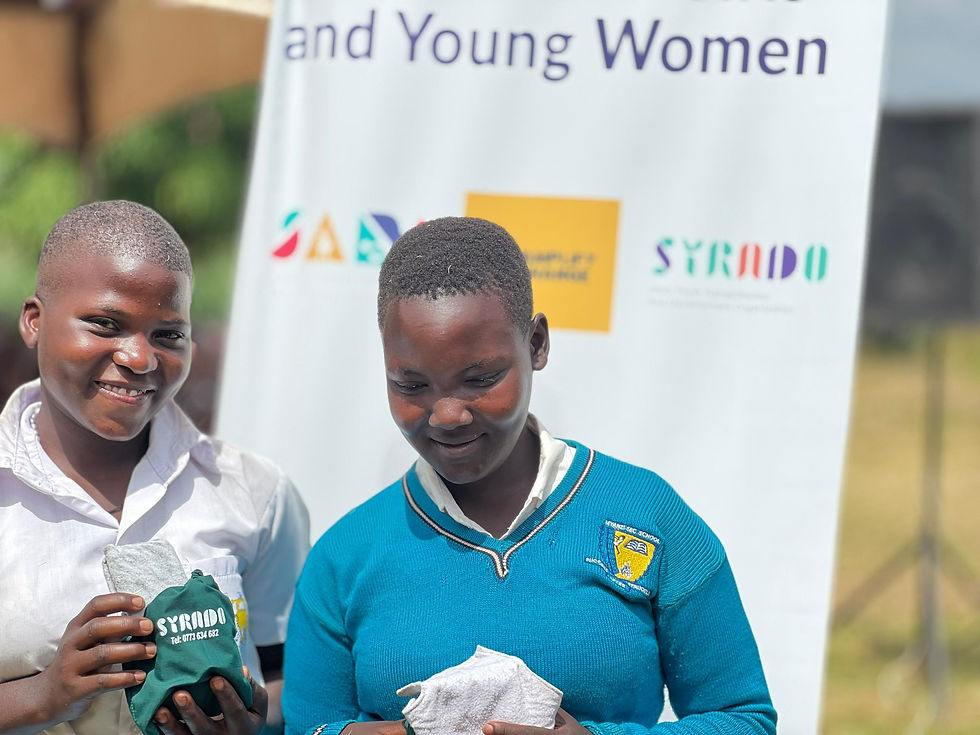Destigmatising school reentry for adolescent mothers
- nalubegasylvia20
- Sep 20, 2022
- 3 min read
Seventeen year old Ninsiima carries her two month baby on the back as she goes to the stone quarry in Mende village to make a living. Together with her eighteen year old cousin Catherine who is a mother of eleven month’s baby, the two young mothers set off to work. They may never get an opportunity to go back to school because they not only fear the stigma, bullying and unkind words they may face at school and community but now they also have to take care of their children. When asked about their dreams are, they hesitate to respond because it seems so farfetched.

Ninsiima and Catherine together with their caretaker working in a stone quarry in Mende.
Currently, teenage pregnancy (pregnancy in girls below the age of 19 years) remains a great challenge in Uganda especially for school retention. Pregnancy is one of the main causes of girls dropping out of school. This is not helped by the fact that many teenagers have limited or no knowledge about family planning until they became pregnant. Moreover like Reverend Peter says, many there is also a general realisation that teenage pregnancy is largely accidental as girls are often victims of rape, defilement and other coercive acts to lure them into early sex.
Whereas in recent years, Uganda has taken bolder steps to protect the right to education of pregnant students and adolescent mothers, Covid19 exacerbated the challenge due to prolonged school closures, lack of protective communities, inaccessibility to sexual and reproductive health services, and lack of remote learning opportunities during the pandemic.
A recent report by UNFPA warned that if no action is taken to ensure these girls stay in school, 60% of teenage mothers will end up in peasant agriculture and annually more than Shs645 billion will be spent by Government on healthcare for teen mothers and education of their children.
In some studies on re-entry of adolescent girls to school, majority of teachers and students are against retention of pregnant girls in school but support the option of reentry of girls into school after giving birth. It is true that showed that adolescent mothers encounter “ridicule and discriminatory language” from both teachers and other students when they return to school. Further, the way schools manage teenage pregnancy varies from school to school with little (if any) oversight. Most schools expel pregnant girls; however this is on moralistic ground and not backed by any government policy, guideline or directive.
According to the ministry of education and sports (MOES), the Ridicule or scorn or discrimination of pregnant girls is considered a form of psychological and emotional violence. Thus, like other forms of Violence against children in schools shall be tracked and resolved using the RTRR (Reporting, Tracking, Referral and Response) guidelines. The School under the leadership of the head teacher is called upon take measures to build its capacity to report and track violence against pregnant girls by fellow learners, teachers and other school staff.
Nonetheless, many affected adolescents are willing to continue with schooling till they complete the school cycle or even attain their excepted academic qualifications. Bearing on the principle of the right to education, the schools have to support these adolescents optimally till they complete the school cycles.
The MOES guidelines “When a girl is discovered to be pregnant, she shall be counseled, and the guidelines for retention or continuation at school and re-entry after pregnancy shall be discussed. The head teacher and other teachers shall work with parents to ensure that there is family support/social support for the pregnant girl.”
School reentry also finds many caretakers with mixed feelings. Whereas some like Jackie’s mother would love to take her daughter back to school, others would rather they get married off to the men who impregnated them.
Like IIhan Ozturk says, education is a powerful driver for development. No society can achieve social-economic growth without investing in the education of its people. It improves the quality of their lives and leads to broad social benefits to individuals and society.
The Taking back my Pen! campaign supported by Urgent Action Fund-Africa is empowering girls with knowledge of their right to education while engaging duty bearers and service providers that girls in our community have equal opportunity to go back to school. SARI is empowering a girls-led grassroots movement to enable girls participate in advocating for fair opportunities in education, youth livelihood initiatives and prevention to gender based violence. SARI also has also engaged relevant stakeholders including community development services offices, village and political leaders, caregivers to enable girls thrive in the community. Through these efforts, we have seen three girls being take back to school and ‘taking back their pen!

SARI team member conducting a rights awareness session among teenage mothers in Sebbi village
Sanyu Centre for Arts and Rights
©2022.





Comments